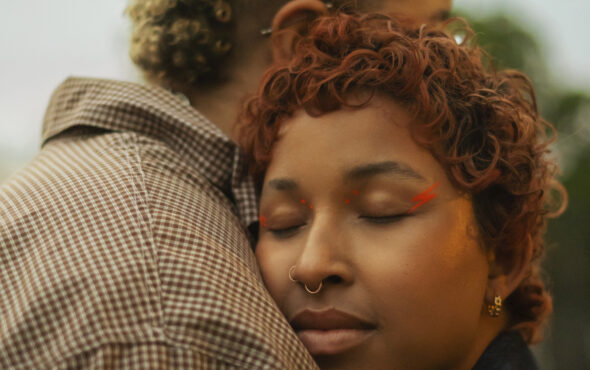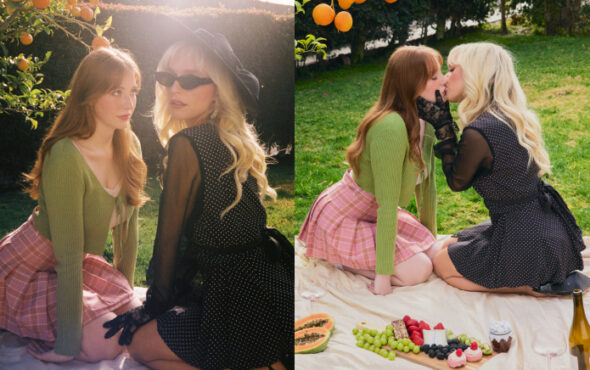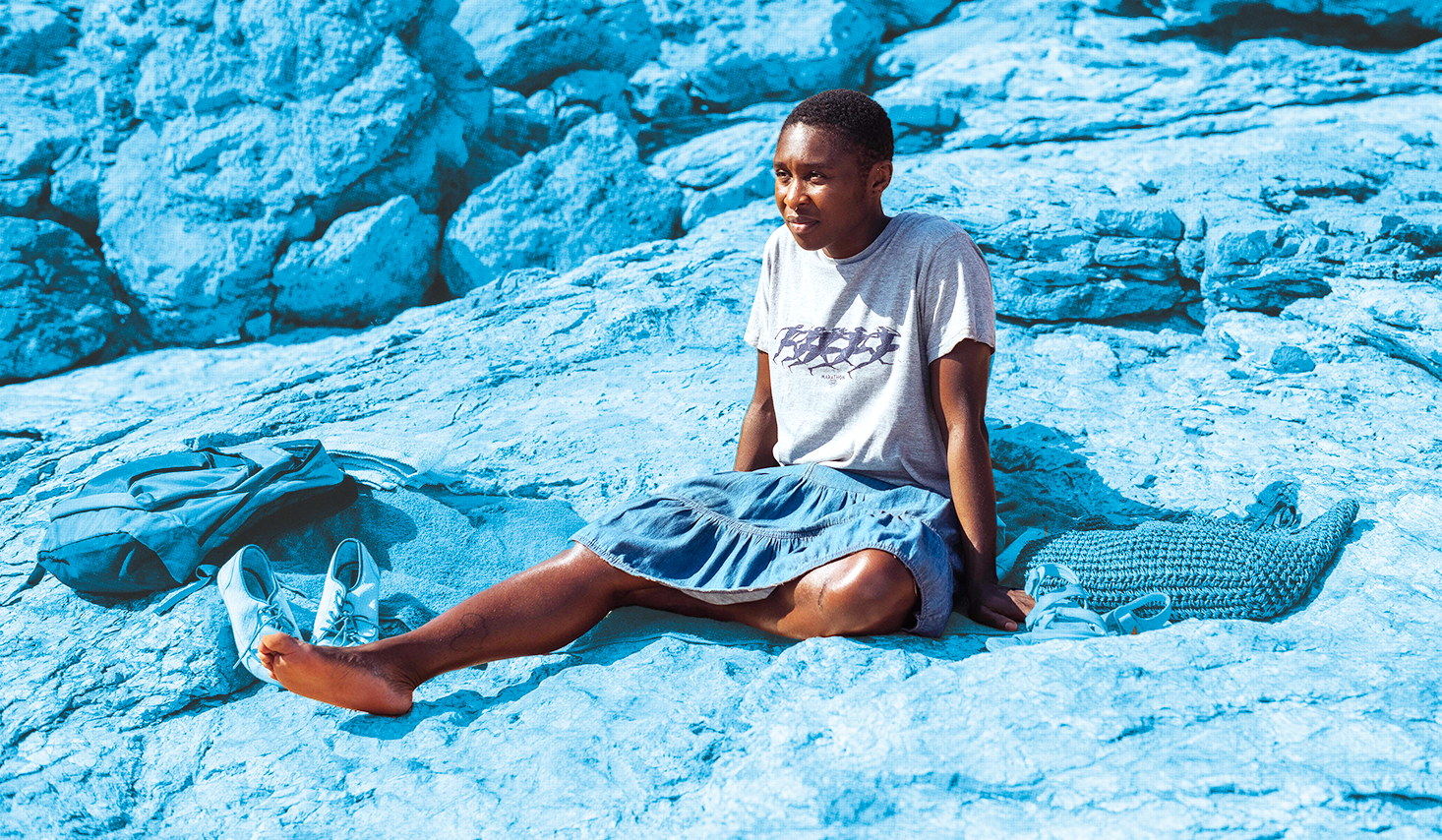
“I want to keep you guessing. I want to keep you entertained,” Cynthia Erivo tells GAY TIMES. “I want you to be like, ‘I have no idea who she’s going to play next.’”
From a Liberian refugee in Drift to a serial killer hunter in Luther: The Fallen Sun and her upcoming Witch of the West in Wicked – all back-to-back, we should add (that’s Meryl Streep behaviour) – the Oscar-nominated actress is determined to have a back-catalogue of “varied” and diverse characters that “tell different stories I haven’t told before”: “I try to make sure that I don’t do the same thing more than once.”
Ahead of Wicked: Part One, launching 27 November, Erivo is celebrating her compellingly restrained role in the aforementioned Drift; Anthony Chen’s acclaimed drama that follows Jacqueline, a young refugee who is forced to sleep on the beach, massage holiday-markers and steal in order to survive. There, she finds some much-needed connection in Callie (Alia Shawkat), a tour guide who, like Jacqueline, is “wounded” by past trauma.
“At this point, Jacqueline hasn’t necessarily connected with anyone or told anyone her story, probably because she’s suffering from PTSD and hasn’t been able to find the words,” says Erivo. “As they spend time with each other, Jacqueline becomes more open and willing to share her story. She does, and when she does, I think it shocks her.”
Here, we speak with Cynthia Erivo about why she was drawn to Drift, the trailblazing depiction of her character’s queerness and the need for more diverse and “human” stories about the LGBTQIA+ community.
What was it about Drift‘s screenplay and Jacqueline’s story that resonated with you?
I loved that she was treated with dignity. Sometimes when we see stories about refugees and those who are displaced, we remove the humanity from them and it becomes just about the situation. We forget that there’s a human being behind all that, a human being who had a life and loved and laughed. This does a really beautiful job of showing you who the human being is behind all of it, and then working with this human being to put the pieces back together. That’s what drew me to this piece, particularly.
Flashbacks to Jacqueline’s past suggest she had a comfortable life. In the present, she’s forced to sleep on the beach and massage holiday-makers for money. How would you describe her journey across the film?
She is the daughter of a politician, so to speak, a delegate. She lived a really comfortable life, went to school in London and didn’t really have a care in the world. As the war starts to progress, her home is raided, her family is killed and she escapes by the skin of her teeth. I think she thinks she shouldn’t have survived. She ends up being the only one [left], and she runs. You meet her, probably after a few months, in Greece, where she’s on her own and making her home wherever she can make it; surviving how she can survive. At this point, Jacqueline hasn’t necessarily connected with anyone or told anyone her story, probably because she’s suffering from PTSD and hasn’t been able to find the words.
I think you meet her when she’s still figuring out the words to use for her situation. She meets this woman called Callie along the way. Callie is this really interesting character, because I think she’s also wounded. That’s what she recognises in Jacqueline; they both have a need for connection. Jacqueline probably doesn’t realise how much she needs connection, and Callie desperately needs the connection. In that, they find each other. As they spend time with each other, Jacqueline becomes more open and willing to share her story. She does, and when she does, I think it shocks her. She does what we all do when we are deeply honest and open and let everything come out, we get scared and run in the other direction. You’re essentially watching this person on a journey of regaining herself, and healing.
Jacqueline’s story and trauma is primarily told with her composure and body language, rather than dialogue. Of course, there’s flashbacks but we get a sense of who she is through your incredible physicality. What was that like for you, as an actor, to rely less on lines to tell the story?
I feel like it’s really freeing. You can do a lot with words, yes, but our bodies are our main instrument for expression. When we’re able to use it to tell the story, for me it was freeing, just because I was able to tap into what it feels like to express uncomfortability without saying, ‘I feel uncomfortable’. Or what it feels like to express anger without saying, ‘I’m angry’. Where do you put the tension? It starts to become a map of, like, the other places where you put pressure, tension, release tension, place the mood – all those things become the way you tell the story. It’s just another thing that I can put in my tool-belt that I have used before, but not to this extent. I feel really lucky to be able to figure that out and give enough for people to understand what she’s going through, without necessarily saying anything.
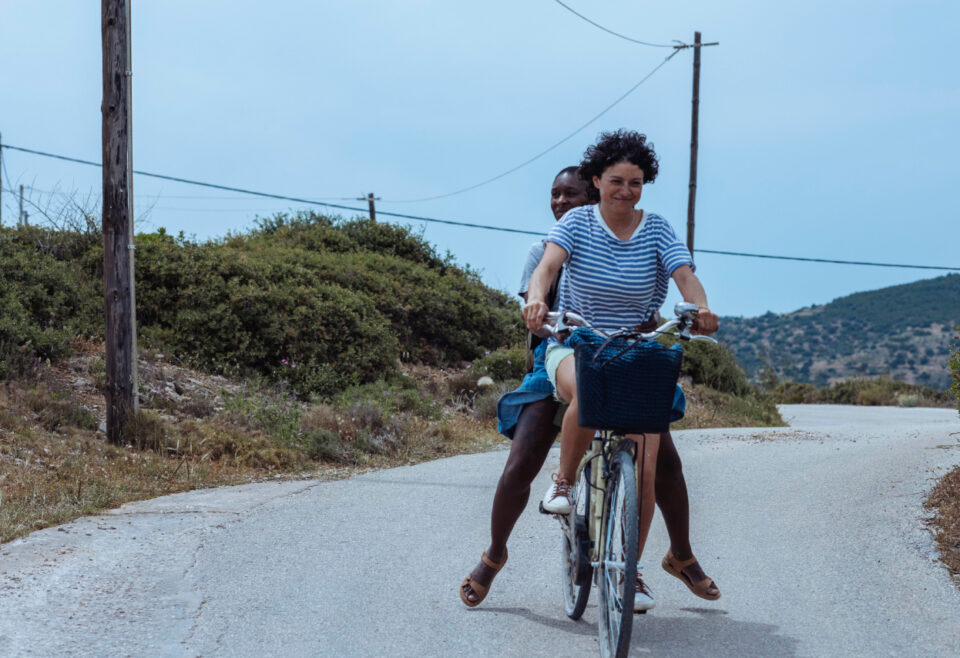
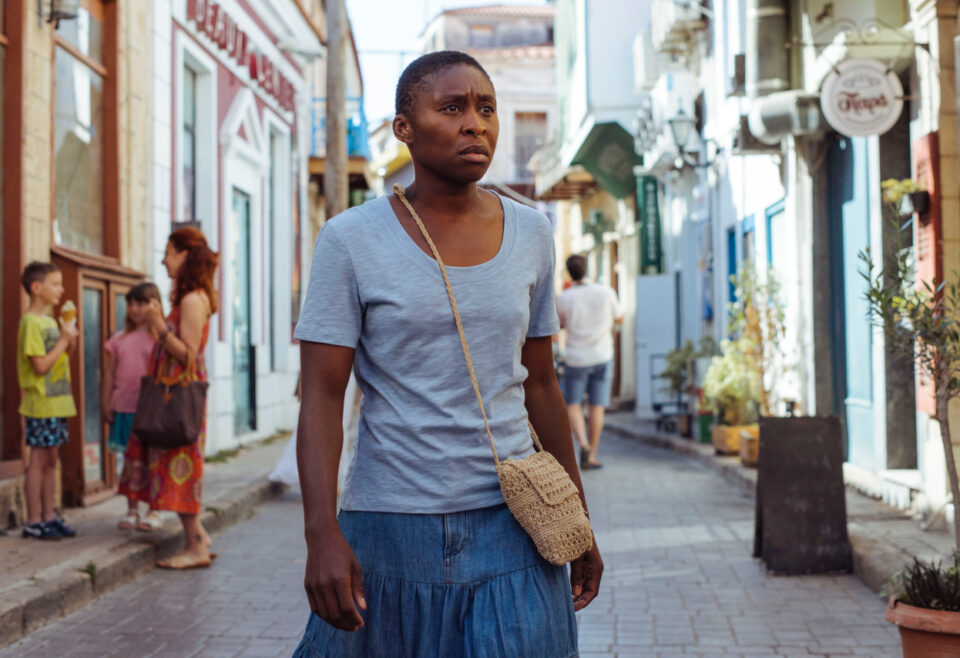
Drift is unique and refreshing in so many ways, but it’s trailblazing that Jacqueline is a queer woman and that’s not an aspect of her identity that is dwelled upon or exploited. As a queer woman yourself, how did you respond to that?
I loved it. I loved it because it was just a part of who she was. That’s something that we don’t necessarily see a lot of. It’s as normal as her waking up and putting clothes on or brushing her teeth. It just happens that she’s queer. I loved that you explore this puppy love that she has with this girl at the beginning, where she sort of realises that she has fallen in love. One of my favourite scenes is the phone call, where she gets a voicemail from her and there’s a deep understanding that she’s not going to see this person again. It’s so quiet and solemn and very singular, and it’s just for her. I loved being able to tell that story, that a queer woman is a person who can go through all of this as well. Often, these stories are told with just a straight person and, for some reason, queer stories don’t exist outside of the natural human experience. But, in this, it’s just part of it.
Queer representation is still not where it should be, although it has improved in recent years. What are your thoughts on LGBTQIA+ visibility in the industry, at the moment?
We’re definitely better than we have been, but there’s always room to grow. Heck, there’s room to grow in telling stories about straight experiences. There’s room to grow in telling stories about women. What next? What else can we talk about? How else can we tell this story? The more we explore and open up, the better our storytelling will become. I’m excited to see us push forward and tell more stories in the way where you can just assume, ‘Well this person might be queer?’ and if it shows up, then it shows up. It’s part of our human existence, it’s not an odd thing to see. I can’t wait for it to just become normal because it is.
And us queers, we’re fun! It’s not all death and despair.
I know! There’s just so much to see. There’s so much more to talk about. In any human experience that doesn’t necessarily surround despair, only.
I find your career so exciting, how you can go from a refugee in Drift to a badass in Luther: The Fallen Sun to a green-skinned witch in Wicked. I have no clue what you’re gonna do next, and I love it.
Thank you! I’ve [intentionally] done it like that. I’m lucky that I’ve got an amazing team who listen to my hair-brained ideas and I try to make sure that I don’t do the same thing more than once. If I’ve met this person, then let’s go find another person who I’ve never met before and play them. I want it to be varied. I want to keep you guessing. I want to keep you entertained. I want you to be like, ‘I have no idea who she’s going to play next. What is it going to be like? I know it’s not going to be like the last one.’ There’s also room for, like… I love doing musicals, so I’m sure there will be another musical. I’m sure of it. I’m sure there’ll be another biopic I love, but I know it’s not going to be tomorrow. I pick the things that draw me in, and they are rarely the same. I’m just glad that people have allowed me to have fun and do that. I blame that on my wonderful team who has encouraged me to pick things that mean something, that tell different stories that I haven’t told before. Thank you for saying that, it means a lot.
Drift is released in UK cinemas on 29 March.
